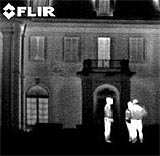 U.S. prosecutors announced today that four members of a Colombian family were indicted by a grand jury on charges that the family attempted to export J85 jet engines from Miami to Iran in violation of the U.S. embargo on Iran.
U.S. prosecutors announced today that four members of a Colombian family were indicted by a grand jury on charges that the family attempted to export J85 jet engines from Miami to Iran in violation of the U.S. embargo on Iran.
The criminal complaint filed earlier this month provides a good deal of detail on the case against the four defendants. Apparently, an Internet advertisement offering to sell twenty-two J85-CAN-15 jet engines led an undercover agent to contact the seller Felipe Echeverry and to indicate that he wanted to purchase the engines for shipment to Iran. The engines in question can be used on the F-5 fighter jets still used by Iran and by the Saegeh fighter jet (pictured right) built by Iran on the F-5 platform. The agent also indicated that he wanted the sellers to handle shipping the engines to Iran.
The transaction proceeded smoothly until the agent first mentioned to the sellers that the U.S. had an embargo on Iran, at which point the sellers began to get cold feet. At first, the sellers said that they would not be involved in shipping the engines, but would only sell them to the agent for pickup in Miami. The agent insisted that this was unacceptable and that the family would at least have to ship the engines as far as Panama. Again, the sellers refused, after which the agent said he was walking from the deal. Later that afternoon, the sellers agreed to ship the items to Panama and the rest, as they say, is history.
The prosecution’s main problem here is that to prove a violation of 50 U.S.C. § 1705, the law alleged to have been violated, the government will need to prove scienter, i.e., that the defendants knew that their actions were a violation of law. Coincidentally, this blog reported yesterday on the Ninth Circuit’s decision in US v. Guo which relied on the scienter requirement of § 1705 to rebut a constitutional challenge that the statute was vague.
In this case, it is reasonable to assume that the defendants believed that they would violate the law only if the shipped the items to Iran, which explains their refusal to ship the items at all when advised of the Iran embargo and later only agreed to ship the items as far as Panama. This is particularly true for defendants that are not even citizens of the United States and are unlikely to be familiar with U.S. law.
It seems to me that the better target of the government’s efforts would be to investigate the circumstances under which military jet engines in the United States were sold to Colombians, likely without a license and likely in violation of the Arms Export Control Act.

 Posted by
Posted by  Category:
Category: 

 Last week the Ninth Circuit
Last week the Ninth Circuit  UK citizen and former U.S. Marine Steven Greenoe (pictured right)
UK citizen and former U.S. Marine Steven Greenoe (pictured right)  In a
In a 


